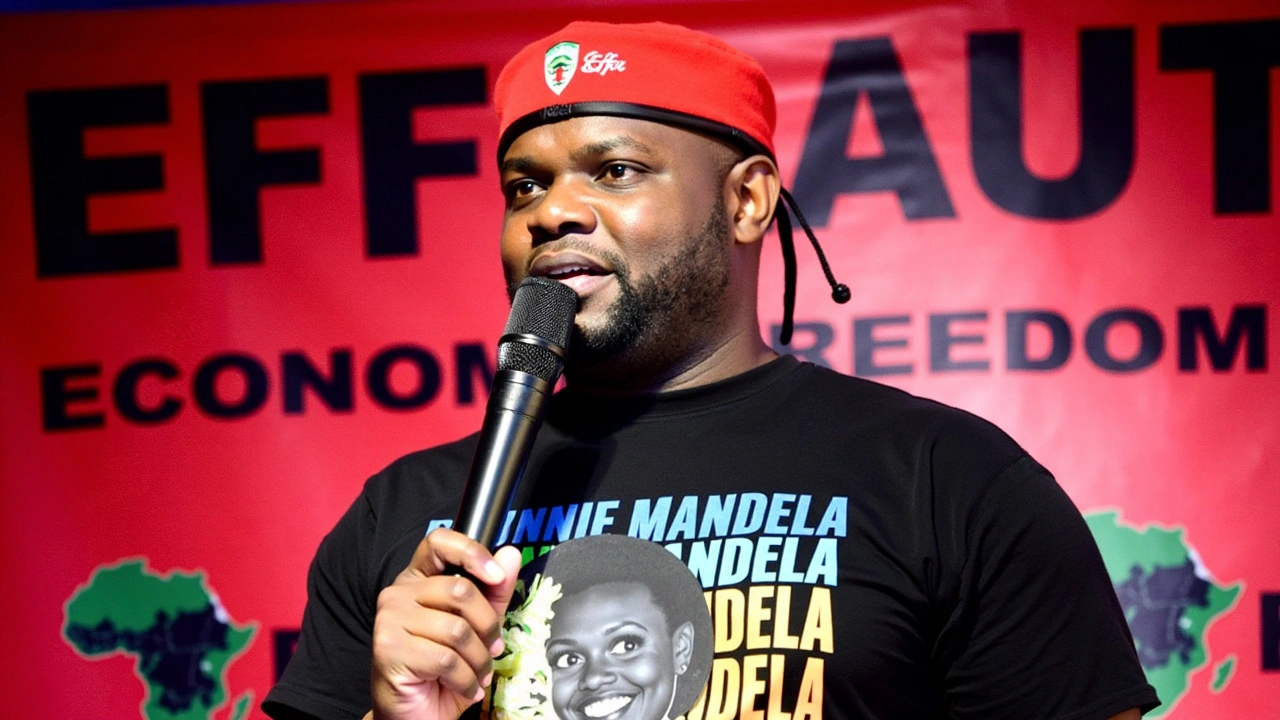Resignation Announcement Shakes South African Politics
In an unexpected move, Floyd Shivambu, Deputy President of the Economic Freedom Fighters (EFF) and a prominent Member of Parliament, announced his resignation on Thursday. The announcement was made at an urgent press briefing held at the EFF's Johannesburg headquarters, catching many by surprise and prompting immediate speculations about the motivations behind his decision and its potential impacts on South Africa's political landscape.
With his resignation, Shivambu vacates one of the most influential positions within the EFF, a party known for its aggressive approach and vocal stands on numerous issues. He communicated his decision to the Chairperson of Ward 44 Johannesburg, stating that his membership in the EFF had expired and that he would not renew it. This resignation marks a pivotal moment, as it raises questions about the internal dynamics of the EFF and its future trajectory without one of its key figures.
Reasoning and Implications
Shivambu was clear in his address that his decision should not be interpreted as a vote of no confidence in the EFF. On the contrary, he described it as a 'revolutionary act' aimed at uniting progressive forces across the political spectrum for genuine, transformative change in South Africa. By stepping down, he hopes to catalyze a broader political realignment that furthers the cause of economic emancipation and true freedom – pillars that the EFF itself was built upon.
His remarks suggest that instead of abandoning his principles, Shivambu sees this move as a strategic maneuver to continue his advocacy more effectively. He has openly joined Jacob Zuma's MK Party, signaling his commitment to pursuing these goals from a new platform. At the same time, Shivambu has hinted that this might not necessarily be a permanent departure from the EFF, leaving open the possibility of a return should circumstances align in the future.
Impact on the EFF and Broader Politics
Shivambu's resignation is undeniably a significant blow to the EFF. As a founding member and a principal figure in its leadership, his departure could lead to internal restructuring and a potential shift in the party's strategies and priorities. The EFF has built its reputation on being a disruptive and vocal opposition, challenging the status quo and pushing radical economic policies. Losing Shivambu could either weaken its influence or inspire it to redefine its approach to maintain its position in South Africa's volatile political arena.
The resignation has also ignited debates about the internal dynamics and possible rifts within the EFF. Observers are keenly watching how other members and supporters respond to this development. Will it trigger further resignations and a splintering of the party, or will it galvanize the remaining leadership to consolidate their efforts around a renewed vision?
The EFF's Future Without Shivambu
The EFF's reaction to Shivambu's resignation and how it adapts to his absence will be crucial in the coming months. The party must reassess its strategies and reaffirm its commitment to its founding principles to reassure its base and maintain its relevance. Julius Malema, the EFF's leader, will likely play a more prominent role in navigating this transitional period, ensuring that the party's goals and messaging remain coherent and compelling.
Shivambu's shift to Jacob Zuma's MK Party also brings additional intrigue to the situation. The amalgamation of his influence and the historical weight carried by the MK Party could introduce a new dynamic to South Africa's political equation. As the nation grapples with economic challenges and social inequalities, the alignment of these two entities may seek to present alternative solutions and mobilize a different segment of the population.
Looking Ahead
Although Shivambu's departure from the EFF and Parliament signifies a significant shift, it also offers an opportunity to reassess and reconfigure strategies. For Shivambu, it is a bold step towards what he sees as a necessary political realignment. For the EFF, it is a moment to reflect on its journey and recalibrate its future without one of its primary architects.
The unfolding developments will undoubtedly be closely watched by political analysts, party members, and South African citizens alike. Shivambu's continued influence on the political stage, now from the perspective of the MK Party, adds a layer of complexity to the ongoing narrative of South African politics. As events unfold, it will become clearer how this resignation and realignment will shape the political landscape and whether it will indeed lead to the progressive, revolutionary change Shivambu aspires to achieve.






Lmao this is just politics as usual. One guy leaves, everyone panics like it's the end of the world.
Oh so now he's a revolutionary because he jumped ship? Cute. The EFF was his platform to be loud, not to be noble.
This is HUGE. Shivambu was the fire in the EFF's belly. Without him, Malema's just shouting into a void now. The party's soul just walked out the door.
I mean... I get the theatrics, but calling it a 'revolutionary act' while joining Zuma? That's like calling a dumpster fire a compost bin. 🤡
The irony is poetic. He claims to seek unity, yet he's deepening the fracture. True revolution doesn't require a new party-it requires a new conscience.
this is all a distraction from the real issue lol the gov is just using this to make ppl forget about the loadshedding and food prices and the fact that the eff was never really about the people anyway its all about image and media and who can scream loudest and now he's just another ex-revolutionary with a new suit and a new name on his door lol
Shivambu’s move is clearly a masterstroke in political realignment. The MK Party’s historical legitimacy combined with his populist rhetoric creates a synergistic disruption that the EFF simply cannot counter with their performative outrage anymore. This isn’t defection-it’s evolution.
You think this is about ideology? Nah. It’s about power. Shivambu saw the writing on the wall and moved to where the real influence is. The EFF was a stepping stone.
I'm just here waiting for the memes. Shivambu in a Zuma suit holding a sign that says 'I'm still radical lol'. The drama is too good. 🙃🔥
Wait so now the EFF is the bad guy because someone left? Bro. The party was built on slogans, not substance. He’s the only one with actual ideas. The rest are just yelling.
I think we're all missing the bigger picture. Shivambu didn't leave because he lost faith-he left because he realized the EFF had become a brand, not a movement. He's trying to rebuild the movement outside the cage. Whether it works? Maybe. But at least he's trying something real.
This is why we need more people like him. Not just yelling from the sidelines. Taking the risk. Building something new. The EFF needed shaking up. He didn't abandon the cause-he expanded it.
I knew it. I KNEW IT. This was all planned. Zuma and Shivambu have been whispering since 2020. The EFF was never meant to last. This is the final act of a long con. The media is blind. The people are asleep. But I see it. I SEE IT ALL.